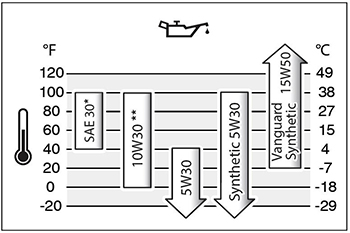So B&S recommends everything from 5w30 to 15w50, and even SAE30wt in a narrow temperature window. Seems they bounce all around 10w40, but don't mention it. Below is their chart.
![Image]()
Kawasaki keeps it simple, and more common sense oriented by simply listing the common multi grades in order and ther respective temperature ranges. Their chart is as follows;
![Image]()
Makes me wander if there isn't something commonly found in 10w40 and 20w50 conventional blends that may damage or compromise something like a catalytic converter they maybe using in some B&S models?

Kawasaki keeps it simple, and more common sense oriented by simply listing the common multi grades in order and ther respective temperature ranges. Their chart is as follows;

Makes me wander if there isn't something commonly found in 10w40 and 20w50 conventional blends that may damage or compromise something like a catalytic converter they maybe using in some B&S models?




